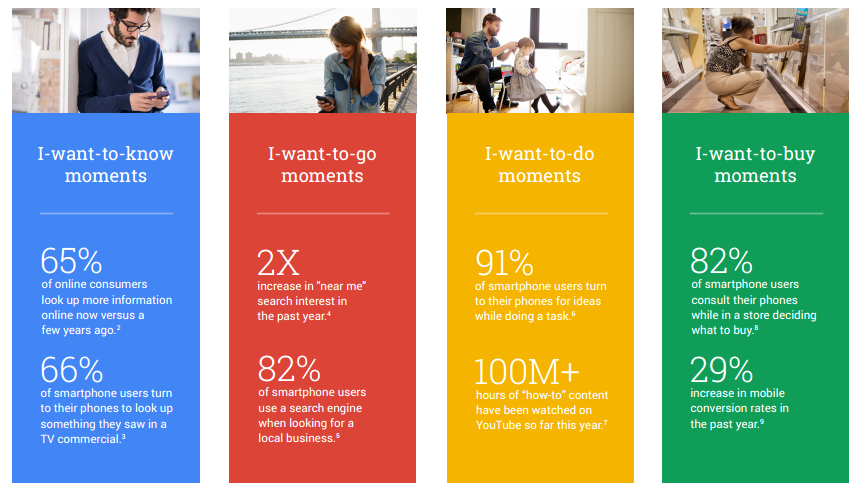What is Voice Search Optimization & How it Will Impact SEO
October 9, 2017
Prashant Shukla
Did you know that 20% of queries on Google’s mobile app and Android devices are voice searches, as revealed by Google CEO Sundar Pichai at the May 2017 Google I/O keynote address?
The advent of personal assistant apps like Siri, Google Now, and Cortana has made it a lot easier for smartphone users to perform voice search and get accurate answers to their queries.
Voice Search vs. Text Search
The underlying difference between voice search and text search is the accuracy of the results that gets delivered to the person entering the search query. A voice search takes the guesswork out of searching as the search intent is quite clear from the user and as a result the search engine presents the most accurate results. So instead of getting several unrelated links in response to a text-based search, the user will get the most relevant responses in reply to the query.
For instance, an internet user who wants to know about Apple CEO Tim Cook through a text-based search is more likely to key in the name itself as the search query whereas users performing voice search tend to be more specific and will say “Who is Tim Cook?” or something on these lines and will get accurate results in a matter of seconds.
Impact of Voice Search on SEO
As per Mary Meeker, voice and image searches are likely to contribute at least half of all searches by 2020. It is therefore in the interest of websites to adapt to this seismic shift that one can expect from text search to voice search in the coming years.
Voice Search Optimization Tips
Whether you are optimizing your web content for Google Voice Search or any other popular search engine, there are some basics that will have to be kept in mind and these include:
#1. Consider Micro-Moments
Efforts towards Voice Search Optimization will have to revolve around the micro-moments around which an online user typically tends to execute a search query. Following are four new micro moments that every marketer must know.

Source: thinkwithgoogle.com
#2. Add a FAQ Page
If you haven’t already, then you must add FAQs on your website to address common questions your target audience might have.
Online searches can be broadly categorized into the following three types:
- Navigational – These are search queries through which a user can navigate to a specific website.
- Informational – A query will be dubbed as informational when a user is requesting for specific information.
- Transactional – Any query that leads to specific actions such as ticket booking or completing an online payment.
By addressing the What, Where, When, Why, and How in your FAQs around these three search types can help you serve the most accurate information for someone using voice search for PC or through a voice search app.
#3. Incorporate Longtail Keywords
The fact that voice searches are centered around natural language, the queries posed to search engines are getting longer. Any good digital marketing agency will stress upon the importance of optimizing the website through the inclusion of such longtail keywords.
#4. Use Microdata to Optimize for Local SEO
Voice-based search queries are coming across as a boon for businesses that rely on local search traffic. Over half of U.S. teens and 41% of U.S. adults are using voice search daily as per Northstar Research. Another fact is that large number of voice searches are around navigational queries such as finding nearby/local businesses. It is therefore important to structure your content to address this rise in local search queries. E.g. While optimizing your website for local SEO, you must make it a point to include all business locations, nearby attractions, landmarks, phone numbers, store hours, etc.
#5. The Hummingbird Update
Google’s 2013 Hummingbird update was a breakthrough in the way in which Google responded to queries typed or spoken on its interface. This update was all about understanding intent around conversational search queries. To know more, read this blog on the Hummingbird algorithm.
#6. Optimize for Natural Language
Conversational questions posed to virtual personal assistants is on the rise as can be verified from the Mary Meeker trends report that states nearly 70% of requests on Google Assistant are in Natural/Conversational Languages. A conversational question that one puts to a smartphone personal assistant therefore tends to be more specific in nature.
#7. Improve your Website Speed
The fact that most searches happen from people on the go makes it important to ensure your website renders well and quickly. Do a page load test to see if your website is loading fast across all browsers and devices.
Additional Read: How to Improve Website Loading Speed
Conclusion
Google recently added 8 additional Indian languages in voice search and rightly so! The next wave of internet adoption will come from Indian regional language internet users which is expected to grow at a CAGR of 18% to reach 536 million by 2021 in comparison to the English internet user base growing at 3% to reach 199 million, as per an April 2017 Google-KPMG study.
You need a Search Engine Optimization services and digital marketing agency that is always on top of such updates in a proactive but not reactive manner. From its app store optimization service to online reputation management and a lot more, at Techmagnate we have scaled every peak there is in the digital ecosystem and have proven credentials to deliver the best digital solutions for your business.
Additional Read: Future of SEO